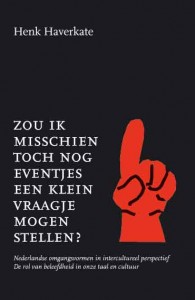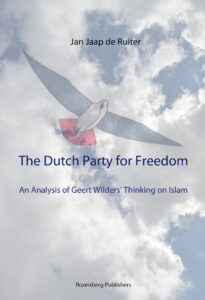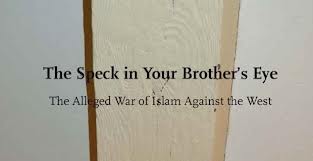Zou ik misschien toch nog eventjes een klein vraagje mogen stellen?
 Vorig jaar zijn mijn vriend Arthur en ik voor het eerst op vakantie naar Spanje geweest. Ons budget was bescheiden en daarom kozen we voor onderdak in eenvoudige hotelletjes. We begonnen in Madrid, waar we een paar dagen verbleven in een pension in het centrum. Het kamermeisje, zo ontdekten we, had een dubbelrol: ze was ook aangesteld om het ontbijt te serveren. Dat ging haar niet echt handig af. De verschillende ingrediënten werden met onregelmatige tussenpozen zonder commentaar voor ons neergezet.
Vorig jaar zijn mijn vriend Arthur en ik voor het eerst op vakantie naar Spanje geweest. Ons budget was bescheiden en daarom kozen we voor onderdak in eenvoudige hotelletjes. We begonnen in Madrid, waar we een paar dagen verbleven in een pension in het centrum. Het kamermeisje, zo ontdekten we, had een dubbelrol: ze was ook aangesteld om het ontbijt te serveren. Dat ging haar niet echt handig af. De verschillende ingrediënten werden met onregelmatige tussenpozen zonder commentaar voor ons neergezet.
Desondanks verzuimde Arthur, die zich vóór ons vertrek had verdiept in het boekje ‘Hoe zeg ik het in het Spaans?’, geen enkele keer beleefd Gracias te zeggen. Eerst reageerde de serveerster enigszins verbaasd, maar daarna sprak er duidelijk irritatie uit haar houding. Arthur, die zich eveneens wat ongemakkelijk begon te voelen, bracht toen zwaarder geschut in stelling en bedankte met Muchas gracias! Deze formule had een totaal averechtse uitwerking; nu werd een vernietigende blik zijn deel. Tegenover mij barstte hij los: ‘Heb je ooit zo’n onbeschoft gedrag meegemaakt? Ze kent nog niet eens de meest elementaire normen van fatsoen!’
Tussen Arthur en het kamermeisje is het niet meer goed gekomen.
The Dutch Party for Freedom. An Analysis of Geert Wilders’ Thinking on Islam – Wartime
 There’s been a lot of talk about Geert Wilders ever since he started his own party, the Dutch Freedom Party. He is prominently present in Dutch politics and that is how the world got to know him. His party has been very successful and from October 2010 until April 2012 it supported the minority government of Liberal Conservatives and Christian Democrats led by Prime Minister Mark Rutte (Liberal Conservative) in exchange for a number of demands.
There’s been a lot of talk about Geert Wilders ever since he started his own party, the Dutch Freedom Party. He is prominently present in Dutch politics and that is how the world got to know him. His party has been very successful and from October 2010 until April 2012 it supported the minority government of Liberal Conservatives and Christian Democrats led by Prime Minister Mark Rutte (Liberal Conservative) in exchange for a number of demands.
Wilders and his party entered the political arena with very strong opinions on Islam and Muslims, basically expressing the view that Islam is not a religion but an ideology. Muslims may be moderate, Islam never is. Islam, he claims, is a threat to Dutch society, to Europe, to the whole world even. When Geert Wilders and his party decided to support the minority government, they could not but also focus on less eye-catching dossiers of a socio-economic nature. The minority government had been in power for a little over a year when Wilders’ party discovered a new issue that would attract everybody’s attention.
In February 2012, it put up a website where people could vent their complaints about Eastern Europeans ‘who steal our jobs and cause innumerable nuisances by their antisocial drinking and shouting behavior’. Even though the website caused an enormous row, in particular in the European Parliament, the party did not withdraw it. Also in February 2012, the Freedom Party started negotiations with the two government parties on major extra budget cuts deemed necessary due to the financial crises in the world. Much to the annoyance of his fellow-negotiators, Wilders pulled out at the last minute, claiming that now that the necessary calculations had been made by the Bureau for Economic Policy Analysis (CPB) he could not live with the financial consequences the cuts would have for his voters, and the government fell. In the weeks before the elections, on 12 September 2012, the Freedom Party focused virtually entirely on ‘the Evil that is Europe’. Muslims or Eastern Europeans were apparently no longer an issue. The parliamentary elections of 12 September 2012 resulted in a major blow to the Freedom Party, which lost nine of its 24 seats. It was the second blow to hit the party, the first one being the downfall of the Rutte government, which was primarily caused by Party leader Wilders. Both events marked a major loss of political power for the Party. This did however not result in the use of a milder discourse when it comes to the Party’s policies and focus on Islam and Muslims. On the contrary. Read more
The Speck in Your Brother’s Eye – The Alleged War of Islam Against the West – Truth
 Marked for Death contains 217 pages and the words ‘truth’ or ‘true’ are mentioned in it at least eleven times. As an academic I am suspicious of the word ‘truth’. I teach my students that undoubtedly, there is such a thing as the truth, but each one of us, including those we see as great thinkers, has his own concept of what the truth is. It was Socrates who postulated that what we see around us is not the real world, that what we see is but an image of it and that we can in effect hardly see reality and if so only with a great deal of effort. Philosopher Immanuel Kant argues that basically we cannot know things, we can only guess at what ‘reality’, at what is ‘real’.
Marked for Death contains 217 pages and the words ‘truth’ or ‘true’ are mentioned in it at least eleven times. As an academic I am suspicious of the word ‘truth’. I teach my students that undoubtedly, there is such a thing as the truth, but each one of us, including those we see as great thinkers, has his own concept of what the truth is. It was Socrates who postulated that what we see around us is not the real world, that what we see is but an image of it and that we can in effect hardly see reality and if so only with a great deal of effort. Philosopher Immanuel Kant argues that basically we cannot know things, we can only guess at what ‘reality’, at what is ‘real’.
Friedrich Hegel does not rule out man fully knowing things, but foresees perfect knowing as a result of a long development the end of which we have not reached as yet. The apostle Paul also claims that as yet we do not know things fully (1 Corinthians 13: 12): ‘For now we see in a mirror, dimly, but then face to face. Now I know in part; then I shall understand fully, even as I have been fully understood’.
Knowing things, knowing reality is not only a subject that occupies the minds of academics, thinkers, philosophers and theologians. It concerns each one of us. If asked to describe an event they have witnessed, different people tend to give different versions of it and may disagree with each other’s interpretations. This is not limited to daily events, but also goes for major events in people’s countries or for things happening in the world. Some may blame the present economic crisis on the irresponsible behavior of banks, while others may claim with equal force that the crisis has been caused by mass immigration. Read more
The Speck in Your Brother’s Eye – The Alleged War of Islam Against the West – Culture
 The following quote is unequivocal about where Wilders stands in regard to what can be considered the best possible culture in the world. When discussing Western civilization he states: ‘When you compare the West to any other culture that exists today, it becomes clear that we are the most pluralistic, humane, democratic, and charitable culture on earth’ (p. 31). Specifying his claim he refers to the ‘Judean-Christian civilization’, which he recognizes is ‘no doubt imperfect’ but of which ‘it is unfair to denounce its faults in a historical vacuum’ (p. 31).
The following quote is unequivocal about where Wilders stands in regard to what can be considered the best possible culture in the world. When discussing Western civilization he states: ‘When you compare the West to any other culture that exists today, it becomes clear that we are the most pluralistic, humane, democratic, and charitable culture on earth’ (p. 31). Specifying his claim he refers to the ‘Judean-Christian civilization’, which he recognizes is ‘no doubt imperfect’ but of which ‘it is unfair to denounce its faults in a historical vacuum’ (p. 31).
Wilders claims Western culture is superior to all other cultures by comparison, but fails to specify which other cultures it is supposed to tower over, apart of course from Islam. Not a word on for instance Asian, i.e. Chinese, Japanese or Korean, cultures. And does Western culture include the Balkans, or Russian culture or Christian African culture? I will come back to these questions later in this chapter.
In his chapter five, The Yoke of Ishmael, Wilders makes some interesting remarks on allegedly superior Western culture. Pages 80-85 deal with the creation of the state of Israel and here he explains why he ‘always feel(s) at home in Israel: it is animated by the same spirit that made Western civilization great – that of the soldier protecting the frontier and the pioneer settling the land’ (p. 84). In the lines preceding this sentence Wilders writes: ‘Their (the Jewish settlers’) spirit is the spirit of the West, the spirit of the pioneers who settled America and spilt “their blood … in acquiring lands for their settlement,” as Thomas Jefferson wrote in 1774’ (p. 84). Both quotes refer to violence. They speak of soldiers and of blood that was spilt acquiring lands. This contradicts what Wilders said earlier and which was discussed in the chapter on Truth, namely that the West should be defended with the word and the pen and not with axes and knives, weapons used by Islam. Or do these lines perhaps require a different interpretation? That superior Western civilization established itself using violence, but that once settled the need to use violence disappeared? This suggestion appears to be corroborated by what we read on page 120: ‘Our commitment to truth, human dignity, and a just and honorable defense of the West do not permit us to resort to bloodshed or to give in to despondency.’ Are we supposed to infer from this that the West no longer uses violence? Read more
The Speck in Your Brother’s Eye – The Alleged War of Islam Against the West – Ideology
 Wilders regards Islam as an ideology: ‘…Islam is not just a religion, as many Americans believe, but primarily a political ideology in the guise of a religion’ (p. 25). ‘(T)the political ideology of Islam is not moderate – it is a totalitarian cult with global ambitions’ (p. 26). If Islam is an ideology, its followers cannot be said to be believers. Still Wilders never refers to Muslims as being adherents of an ideology. He does not give them a new name like ‘Islam ideologists’ for instance. He goes on calling them Muslims but obviously for him the term Muslim has a different meaning than it has for the average reader, who regards Muslims as adherents of a religion.
Wilders regards Islam as an ideology: ‘…Islam is not just a religion, as many Americans believe, but primarily a political ideology in the guise of a religion’ (p. 25). ‘(T)the political ideology of Islam is not moderate – it is a totalitarian cult with global ambitions’ (p. 26). If Islam is an ideology, its followers cannot be said to be believers. Still Wilders never refers to Muslims as being adherents of an ideology. He does not give them a new name like ‘Islam ideologists’ for instance. He goes on calling them Muslims but obviously for him the term Muslim has a different meaning than it has for the average reader, who regards Muslims as adherents of a religion.
The confusion only grows when we learn that Wilders makes a weird distinction between Islam on the one hand and its followers, the Muslims, on the other. He states that ‘there are many moderate Muslims, but that does not change the fact that the political ideology of Islam is not moderate’ (p. 26). ‘We are fortunate that the majority of the world’s 1.5 billion Muslims do not act according to the Koran…’ (p. 26). Islam is evil; Muslims who do not fully implement Islamic ideology are not necessarily evil. Could this mean then that Muslims can be good? This is not what Wilders is saying here but it is what he is implying, either intentionally or not. In the end, making a distinction between the ideology and its followers can only lead to disaster. Because, ultimately, the followers are all potential instruments of this evil ideology and as such a danger to world peace. If Wilders’ view of evil Islam and its potentially evil adherents were to become part of mainstream political thinking and acting, would that not create a huge risk of these followers becoming the objects of violence? Would it not create a situation where the people, or even the authorities, convinced of the risk Muslims constitute, will act accordingly and start oppressing and chasing them? It is for this reason that I find Wilders’ artificial distinction between ideology and its followers a highly dangerous one. And in fact, reading Wilders’ book, in particular chapters 5 and 6 on the history of Islam, and the last chapter where he presents his view on the (future) path to follow in respect to Islam one notices that where he speaks of ‘Islam’, he cannot but mean ‘Muslims’. When he claims that Islam with its jihad caused the deaths of millions of people in India (p. 89), my question to him would be: ‘Who, in your opinion, was it that killed in India? Was it Islam? Or was it Muslims?’ The distinction proposed by Wilders is ultimately untenable. Ideologies do not kill. It is people who kill. His hatred is not directed at an ideology, it is directed at people, at Muslims. Read more
The Speck in Your Brother’s Eye – The Alleged War of Islam Against the West – Solution
 The title of Wilders’ last chapter speaks for itself: How to turn the tide. Having established in the twelve preceding chapters the evil character of the would-be religion of Islam, its devastating effects on the history of the world and the threat it poses to world peace today, it is now time to come up with a solution. The seventeen pages of this final chapter gives us Wilder’s view on how to turn this tide and of the different parts of the solution, I find the following the most telling: ‘Muslims must defeat Islam’ (p. 212). This sounds a bit strange and not really feasible, but from Wilders’ perspective it is quite logical. Islam is not a religion; it is, under all circumstances, an aggressive ideology that seeks to conquer the world. People who follow this ideology are Muslims.
The title of Wilders’ last chapter speaks for itself: How to turn the tide. Having established in the twelve preceding chapters the evil character of the would-be religion of Islam, its devastating effects on the history of the world and the threat it poses to world peace today, it is now time to come up with a solution. The seventeen pages of this final chapter gives us Wilder’s view on how to turn this tide and of the different parts of the solution, I find the following the most telling: ‘Muslims must defeat Islam’ (p. 212). This sounds a bit strange and not really feasible, but from Wilders’ perspective it is quite logical. Islam is not a religion; it is, under all circumstances, an aggressive ideology that seeks to conquer the world. People who follow this ideology are Muslims.
But a real Muslim, in Wilders’ eyes, is one that follows the tenets of Islam and complies with what they require him to do in the full devastating sense of the word. Those who do not strictly and fully follow them are in fact no longer Muslims in the true sense of the word. This then is the answer to the question why Wilders did not assign a new term to Muslims who are not fully ‘observant’. He makes a distinction between Islam and Muslims and now we understand what it is he wants to say. A real Muslim is the one who acts in full compliance with the aggressive ideology of Islam.
Those who do not do so are in fact not Muslims or are so no longer. In Wilders’ own words: ‘People who reject Islam’s violent, intolerant, and misogynistic commandments may be moderates, but they are not practicing “moderate Islam” – they are not practicing Islam at all’ (p. 212). Having read this quote, my question is why Wilders has a problem with what he calls moderate Muslims, if they are in fact, as he says himself, no longer Muslims. If they are not Muslims, they fall outside the scope of Islam, and as such no longer constitute a danger. Naturally, Wilders does not go into this implication of his logic. We will see below that Wilders wants all Muslims, moderate or not, to ‘defeat Islam’. Read more


